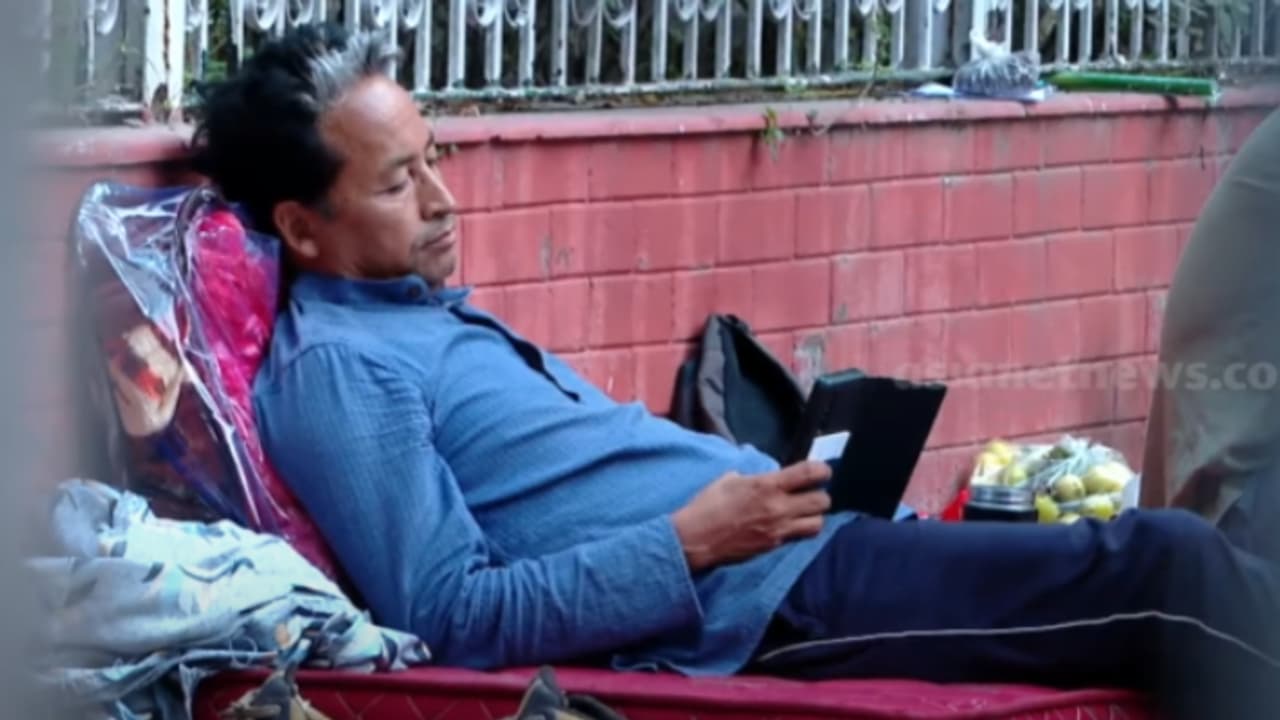Climate activist Sonam Wangchuk was arrested under the NSA after Leh protests on September 24 turned violent, leaving four dead. Ladakh DGP SD Singh Jamwal alleged Wangchuk’s links with Pakistan and Bangladesh and accused him of inciting violence.
Climate activist Sonam Wangchuk, who had been leading a hunger strike demanding statehood for Ladakh and inclusion in the Sixth Schedule of the Constitution, was arrested under the National Security Act (NSA) on Friday. He has been lodged in Jodhpur Central Jail.
The arrest comes in the wake of violent protests in Leh on September 24, during which four people were killed and nearly 80 others, including police personnel, were injured. The protests had turned violent, with BJP offices and vehicles being set on fire.
DGP alleges foreign links
Ladakh Director General of Police (DGP) SD Singh Jamwal accused Wangchuk of having links with Pakistan and raised questions about his visits to neighbouring countries, including Pakistan and Bangladesh.
“We arrested a Pakistan PIO recently who was reporting back across. Sonam Wangchuk had attended a Dawn event in Pakistan and also visited Bangladesh. So, there is a big question mark on him. Investigation is being done,” DGP Jamwal said.
The DGP also claimed that Wangchuk had instigated violence during the September 24 protests and referenced foreign examples like the Arab Spring, Nepal, and Bangladesh. Authorities are investigating funding sources under the Foreign Contribution (Regulation) Act (FCRA).
Details of the Leh Violence
On September 24, a large group of protesters gathered in Leh demanding statehood and Sixth Schedule inclusion for Ladakh. The situation turned violent with 5,000–6,000 people attacking government buildings and offices of political parties, throwing stones, and setting fire to property.
According to DGP Jamwal, four civilians were killed in police firing while trying to control the mob. Dozens of police and paramilitary officers were injured, including three women officers who were trapped in a building set on fire.
The police have arrested 44 people in connection with the violence. Wangchuk was identified as a ‘prime orchestrator’ of the unrest.
Wangchuk’s Role and Hunger Strike
Sonam Wangchuk had been leading a hunger strike to press for statehood and inclusion of Ladakh under the Sixth Schedule. The strike ended amid the escalating violence on September 24.
Wangchuk denied allegations of instigating the violence and expressed willingness to be arrested. He told ANI, “I would be happy to be arrested anytime because it will make people more aware. Perhaps, this will be the last series of my service to the country.”
Government Actions and MHA Statement
The Ministry of Home Affairs (MHA) blamed Wangchuk for the violence, stating that he incited the crowd through provocative statements. Following this, his Students Educational and Cultural Movement of Ladakh (SECMOL) had its FCRA licence cancelled for alleged violations.
Curfew-like restrictions were imposed under Section 163 of the Bharatiya Nagarik Suraksha Sanhita (BNS), 2023. Assembling five or more persons was banned, and no rallies or processions were allowed without prior approval.
Political Reactions
The arrest drew sharp criticism from opposition parties.
Congress accused the BJP of mishandling law and order in Ladakh. Congress leader Jairam Ramesh said, “The arrest of Sonam Wangchuk is to divert attention from the BJP’s failure in maintaining security. The government needs to engage sincerely with the people of Ladakh.”
AAP Chief Arvind Kejriwal called the arrest ‘dictatorial’ and compared it to historical figures who misused power.
Punjab Education Minister Harjot Singh Bains described the detention as a direct attack on democracy, highlighting Wangchuk’s contributions to education in Ladakh.
Jammu and Kashmir CM Omar Abdullah termed the arrest ‘unfortunate’ but unsurprising, accusing the Central government of reneging on promises made to Ladakh.
Local Leaders and Apex Leh Body’s Statement
The Apex Leh Body (ABL), which is leading the peaceful agitation for Ladakh’s statehood, denied any foreign involvement and blamed the unrest on youth frustration over unemployment.
A member of the ABL said, “Our movement is peaceful. The violence occurred because a few youths got out of control on September 24. Sonam Wangchuk’s role has been misrepresented.”
They further stated that prayers and calls for nonviolence were organised during the hunger strike, and the large turnout was due to concern for the protesters’ health and well-being.
Security Measures and Investigations
Following the unrest, security forces were deployed in Leh to maintain order. Curfew relaxations are planned in phases, and authorities continue to investigate any foreign connections or funding violations. The police are also reviewing videos, social media posts, and speeches that may have influenced the escalation of the protests. Two additional people were arrested during the ongoing investigation, but their exact role remains under scrutiny.
The arrest of Sonam Wangchuk has escalated political tensions in Ladakh and across India. While authorities maintain that the detention is necessary for national security and law and order, opposition parties and local leaders argue that the move suppresses dissent and violates democratic rights.
With ongoing investigations into foreign links, FCRA violations and the September 24 violence, the situation in Ladakh remains tense. Authorities continue to enforce restrictions to prevent further unrest while preparing for the upcoming high-level talks with the Central government.
(With ANI inputs)
